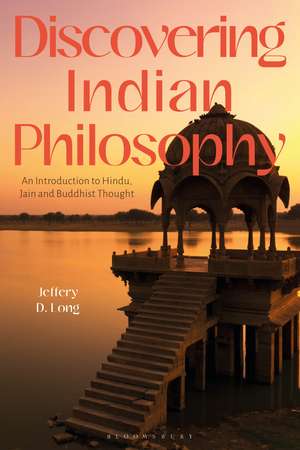Discovering Indian Philosophy: An Introduction to Hindu, Jain and Buddhist Thought
Autor Jeffery D. Longen Limba Engleză Hardback – 21 feb 2024
| Toate formatele și edițiile | Preț | Express |
|---|---|---|
| Paperback (1) | 133.61 lei 3-5 săpt. | |
| Bloomsbury Publishing – 21 feb 2024 | 133.61 lei 3-5 săpt. | |
| Hardback (1) | 407.76 lei 6-8 săpt. | |
| Bloomsbury Publishing – 21 feb 2024 | 407.76 lei 6-8 săpt. |
Preț: 407.76 lei
Preț vechi: 536.49 lei
-24% Nou
Puncte Express: 612
Preț estimativ în valută:
78.03€ • 81.67$ • 64.94£
78.03€ • 81.67$ • 64.94£
Carte tipărită la comandă
Livrare economică 31 martie-14 aprilie
Preluare comenzi: 021 569.72.76
Specificații
ISBN-13: 9781784536459
ISBN-10: 1784536458
Pagini: 248
Dimensiuni: 156 x 234 x 22 mm
Greutate: 0.53 kg
Editura: Bloomsbury Publishing
Colecția Bloomsbury Academic
Locul publicării:London, United Kingdom
ISBN-10: 1784536458
Pagini: 248
Dimensiuni: 156 x 234 x 22 mm
Greutate: 0.53 kg
Editura: Bloomsbury Publishing
Colecția Bloomsbury Academic
Locul publicării:London, United Kingdom
Caracteristici
Accessible introduction to the philosophical insights and major thinkers of such schools of thought as Vedanta, Jainism and Buddhism, among others
Notă biografică
Jeffery D. Long is Professor of Religion and Asian Studies at Elizabethtown College, USA. Jeffery specializes in the religions and philosophies of India. He is the author of several books and numerous articles, as well the editor of the series Explorations in Indic Traditions.
Cuprins
Acknowledgements Pronunciation Guide Introduction: Approaching Indian Philosophy 1. Vedic Thought Philosophies of Action and Knowledge 2. Jain and Materialist Thought Strivers and Sceptics3. Turning the Wheel of DharmaThe Buddha's Synthesis4. The Buddhist Conversation UnfoldsDharmas, Emptiness, and Non-Dual Consciousness5. Vedic Thought RevisitedSastras, Epics, and the 'Orthodox Systems'6. Vedanta and TantraThe Interplay of Duality and Non-Duality7. The Modern PeriodIndian Philosophy Goes GlobalBibliographyIndex
Recenzii
Spanning the gamut from ancient Vedic thought to modern philosophical figures, Jeffery Long provides a lucid and comprehensive introduction to Indian philosophy. Written in the voice of a seasoned teacher, this engaging book would be welcomed both by university students as well as lifelong learners interested in Indic thought.
Long presents the story of Indian philosophy in a clear and readable narrative that weaves together historical, cultural, religious, and philosophical discussions to paint a compelling, vivid, and nuanced portrait of the Indian philosophical tradition.
This book is a laudable venture, especially because of the author's approach to present a multi-faceted, millennia-old dialogical tradition under the caption of 'Discovering Indian Philosophy', not simply as a matter of antiquarian interest but as a living and growing enterprise. Jeffery Long has first-hand knowledge of the Upanisadic, Buddhist and Jaina traditions, which he has studied and taught over many years. His focus on specific issues and concerns demonstrates his philosophical sensitivity and capacity to render the relevance of these ideas from the Indic sources for human enquiry, as recorded in the global history of ideas. The construal of the very idea of philosophy in the Indian context is done by analyzing such Sanskrit words as Darsana and Anviksiki that can add a new dimension to the age-old discussions on the conflicts between science, philosophy and religion in the Western discourse. There are many more such examples in the text.
Long presents the story of Indian philosophy in a clear and readable narrative that weaves together historical, cultural, religious, and philosophical discussions to paint a compelling, vivid, and nuanced portrait of the Indian philosophical tradition.
This book is a laudable venture, especially because of the author's approach to present a multi-faceted, millennia-old dialogical tradition under the caption of 'Discovering Indian Philosophy', not simply as a matter of antiquarian interest but as a living and growing enterprise. Jeffery Long has first-hand knowledge of the Upanisadic, Buddhist and Jaina traditions, which he has studied and taught over many years. His focus on specific issues and concerns demonstrates his philosophical sensitivity and capacity to render the relevance of these ideas from the Indic sources for human enquiry, as recorded in the global history of ideas. The construal of the very idea of philosophy in the Indian context is done by analyzing such Sanskrit words as Darsana and Anviksiki that can add a new dimension to the age-old discussions on the conflicts between science, philosophy and religion in the Western discourse. There are many more such examples in the text.
